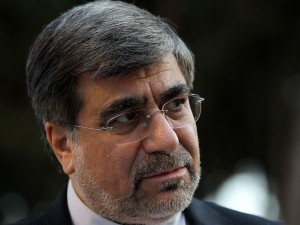 Bookshops in�Iran�could soon be allowed to stock a wider range of titles, after culture minister Ali Jannati said that "books subjected to�censorshipor denied permission to be published in the past will be reviewed again".
Bookshops in�Iran�could soon be allowed to stock a wider range of titles, after culture minister Ali Jannati said that "books subjected to�censorshipor denied permission to be published in the past will be reviewed again".The minister's words suggested an opening-up of the country's publishing industry under new president�Hassan Rouhani, who has already signalled his willingness to make changes by agreeing to�the first presidential telephone conversation with America since the 1979 revolution.
A swathe of literary classics and international bestsellers including Tracy Chevalier's Girl With a Pearl Earring and Dan Brown's The Da Vinci Code were banned in Iran in a publishing lockdown�imposed by former president Mahmoud Ahmadinejad in 2006, soon after he came to power.
According to�Egypt's Ahramonline news outlet, Jannati told Iran's official news agency IRNA this week: "Those books subjected to censorship or denied permission to be published in the past will be reviewed again and new decisions will be made. Our approach towards freedom of the press and books, as well as relaxing the atmosphere for writers and thinkers, is different from the past and its results will gradually become apparent."
In the reformist daily newspaper, Arman, Jannati was quoted earlier this month, saying: "I sadly learned that some books were denied permission to be published only on the grounds of personal opinions. I think if the Qu'ran was not a divine revelation, when it was handed to the book supervisory board, they would say some words did not comply with public chastity and would deny it permission for publication."
"I would hazard a guess that we won't be seeing�The Satanic Versesappear anytime soon in a new Iranian edition, but one hopes that the works of banned Iranian authors such as the great�Sadegh Hedayat,Shahrnoush Parsipour�and the late�Houshang Golshiri�will be given freer rein now," said Mitch Albert, of�Westbourne Press,�an independent, London-based publishing house specialising in books on North Africa and the Middle East.
He added: "The culture minister's remark that even the Qur'an would not have passed current censorship laws is certainly a strong one, in the Iranian context. Let us hope it leads to greater freedom of expression."
Apart from international imports banned in 2006, such as William Faulkner's As I Lay Dying and collections of lyrics by the Beatles and the Rolling Stones, the relaxation of censorship could affect scores of works by Iranian authors including�Ebrahim Golestan, and Hedayat, whose novel The Blind Owl was�listed as one of Iran's top 10 books�by journalist�Kamin Mohammadi.
Albert said that Iran's cultural overtures were significant and should be taken at face value. "I get irritated by people's reflected caution and the assumption that there must be an ulterior motive. There is a liberalising strain in the culture which has not been given expression in the past, but they are coming to realise that it's better to be part of the global community than not," he said.
Jannati's comments echo president Rouhani's assertion, during his swearing-in speech in August, that he would�relax restraints on internet filters.
In�an interview with CNN�last month, Rouhani said: "All my efforts are geared to ensure that the people of Iran will comfortably be able to access all information globally and to use it. There are large social networks at a global level around today. And I believe that all human beings have a right, and all nations have a right, to use them."
The country blocks access to at least five million websites, including Facebook and Twitter.
Rouhani, whose Twitter account, @hassanrouhani, is thought to be run by a close associate,�earlier this month tweeted to Jack Dorsey, Twitter co-founder, that he would work to ensure that Iranians have access to all information globally "as is their #right" [].
By The Guardian
The Iran Project is not responsible for the content of quoted articles.










